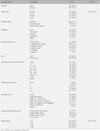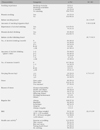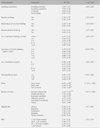Abstract
Purpose
The purpose of this study was to investigate the effects of health behavior-related characteristics, self-esteem, activities of daily living, and family support on depression in the community-dwelling elderly.
Methods
The participants were 229 elders sampled from Seoul and other five provinces. A structured questionnaire was used to collect data, and data were analyzed by applying t-test, ANOVA, Pearson correlation coefficient, and stepwise multiple regression with SAS 8.12.
Results
There was a negative correlation between depression, MMSE-K, self-esteem, ADL, IADL, and family support. Depression and health behavior-related characteristics showed a significant difference according to stress level and the reason of stress. Major factors that affected the elders' depression were self-esteem, the amount of alcohol drinking, sleeping hours, ADL and the cognition of health status, which explained 59.4%.
Conclusion
Based on the findings of this study, self-esteem and health behavior-related characteristics including alcohol drinking, sleeping hours and ADL were the influencing factors of depression in the community-dwelling elderly. Therefore, effective psychological and physical health promotion methods need to be developed and applied in nursing interventions to prevent depression in the community-dwelling elderly.
Figures and Tables
References
1. Bae JN. Accuracy of geriatric depression scale, Korean version (GDS) in the assessment of DSM-III-R major depression. Seoul: Seoul National University;1996. Unpublished master's thesis.
2. Breslow L, Enstrom JE. Persistence of health habits and their relationship to mortality. Prev Med. 1980; 9:469–483.

3. Cho MJ, Bae JN. Impact of socio-cultural changes on mental health of the elderly in Korea. Ment Health Res. 1994; 13:82–96.
4. Cho MJ, Bae JN, Suh GH, Hahm BJ, Kim JK, Lee DW, et al. Validation of geriatric depression scale, Korean version(GDS) in the assessment of DSM-IIIR major depression. J Korean Neuropsychiatr Assoc. 1999; 38(1):48–63.
5. Choi I, Kim YS, Suh KH. The psychosocial factors affecting suicidal ideation of the elderly. Health Soc Sci. 2009; 25:33–56.
6. Hur JS, Yoo SH. Determinants of depression among elderly persons. Ment Health Soc Work. 2002; 13(6):7–35.
7. Folstein MF, Folstein SE, McHugh PR. "Mini-mental state": A practical method for grading the cognitive state of patients for the clinician. J Psychiatr Res. 1975; 12:189–198.
8. Jang MH, Won JS. Association of anger and anger expression, social support, self-esteem, and depression in elderly. J Korean Acad Psychiatr Ment Health Nurs. 2009; 18(3):259–268.
9. Jeon HS, Kahng SK. Predictors of depression trajectory among the elderly using the Korean welfare panel data. J Korean Gerontol Soc. 2009; 29(4):1611–1628.
10. Jon BJ. Self-esteem: A test of its measurability. Yonsei Nonchong. 1974; 11(1):107–130.
11. Katz S, Ford AB, Moskowitz W, Jackson BA, Jaffe MW. Studies of illness in the aged. The index of ADL: A standardized measure of biological and psychosocial function. JAMA. 1963; 185:914–919.
12. Kim DB, Sohn ES. A meta-analysis of the variables related to depression in elderly. J Korean Gerontol Soc. 2005; 25(4):167–187.
13. Kim HS, Kim BS. The effects of self-esteem on the relationship between the elderly stress and depression. J Korean Gerontol Soc. 2007; 27(1):23–37.
14. Kim MA, Kim HS, Kim EJ. Cognitive function and depression in the elderly. J Korean Gerontol Nurs. 2005; 7(2):176–184.
15. Kim YS, Yoo MS, Park JH. Factors influencing depression in community-dwelling elderly with low income. J Korean Gerontol Soc. 2009; 29(4):1313–1325.
16. Kwon YE, Ha J, Ahn SY. A study of the perceived health status, activities of daily living, depression for the elderly at home. J Korean Gerontol Soc. 2007; 27(2):335–343.
17. Lawton MP, Brody EM. Assessment of older people: Self-maintaining and instrumental activities of daily living. Gerontologist. 1969; 9(3):179–186.

18. Lee HJ, Lee JY. The effects of socioeconomic position and health behavior on geriatric depressive symptom. J Korean Gerontol Soc. 2008; 28(4):1129–1145.
19. Lee KJ, Park HS. A study on the perceived health status, depression, and activities of daily living for the elderly in urban area. Korean J Women Health Nurs. 2006; 12(3):221–230.
20. Ministry of Health and Welfare. 2008. National elderly living conditions survey (11-1351000-000316-12). Seoul: Ministry of Health and Welfare;2009a.
21. Ministry of Health and Welfare. 2010 National elderly welfare facilities survey (11-1352000-000002-10). Seoul: Ministry of Health and Welfare;2009b.
22. Moon SK, Chung JE, Sohn ES. Analysis of the mediating effects of family support and social participation between daily hassles and depression for the elderly with stroke disabilities. Korean J Fam Welf. 2008; 24(4):223–248.
23. Park JH, Kwon YC. Standardization of Korean version of the mini-mental state examination (MMSE_K) for use in the elderly. Part II. Diagnostic validity. J Korean Neuropsychiatr Assoc. 1989; 28(3):508–513.
24. Park MJ. Buffering effects of strengths and social support between stress and depression of the elderly women. Korean J Woman Psychol. 2007; 12(2):197–211.
25. Rosenberg M. Society and adolescent self image. Princeton, NJ: Princeton University Press;1965.
26. Seo JM, Kim MH, Kim JS. Discriminating power of depression of elderly women by arthralgia, physical function and physical self-efficacy. J Korean Acad Psychiatr Ment Health Nurs. 2006; 15(3):237–245.
27. Shin KR, Kang Y, Jung D, Choi KA. A study on the depression, somatic symptom, activities of daily living for the elderly women in an urban area. J Korean Acad Nurs. 2007; 37(7):1131–1138.

28. Sohn SH. Differences in cognitive function and activities of daily living between two groups without depression among patients with senile dementia. Seoul: Ewha Womans University;1998. Unpublished master's thesis.




 PDF
PDF ePub
ePub Citation
Citation Print
Print







 XML Download
XML Download